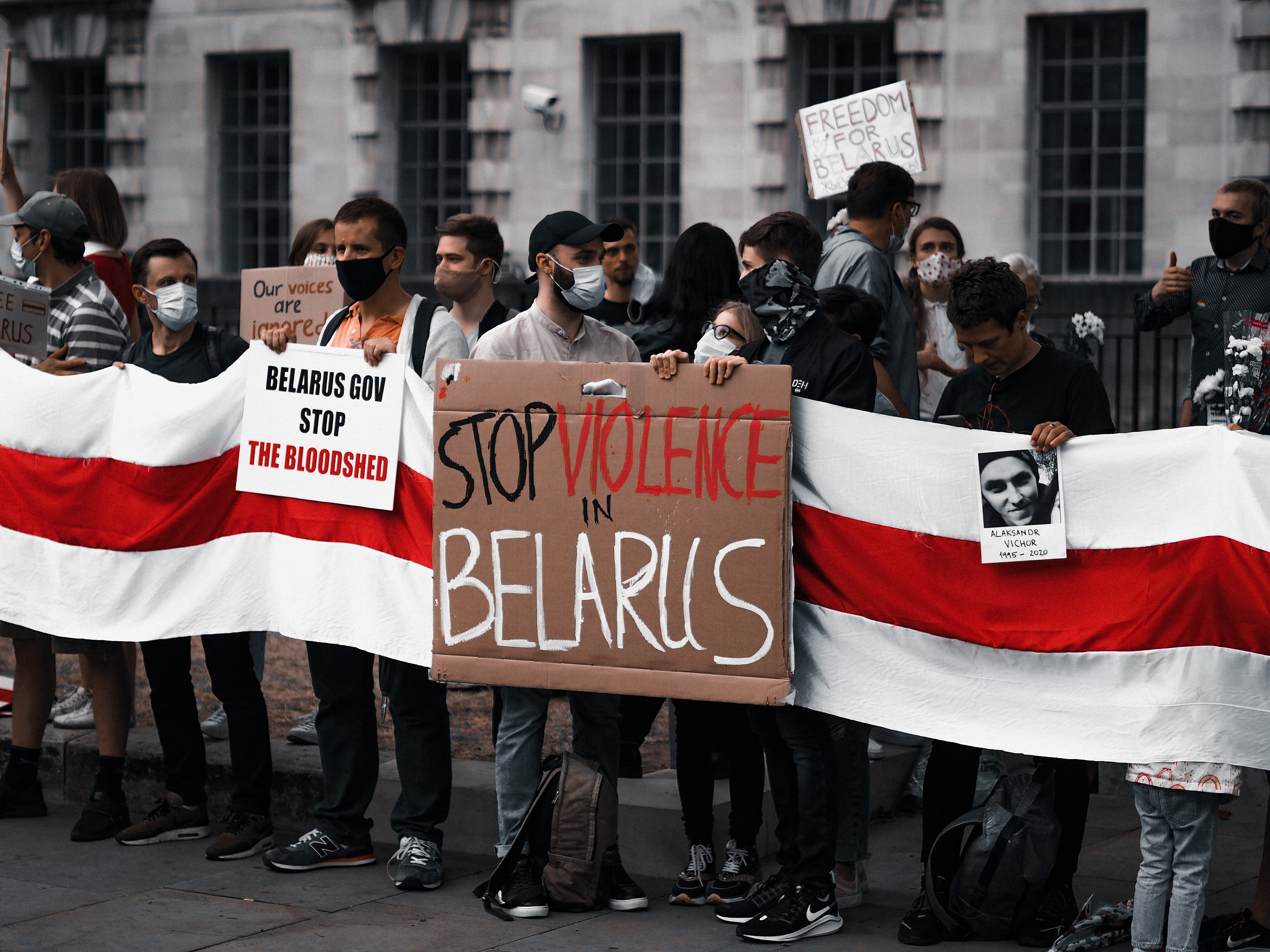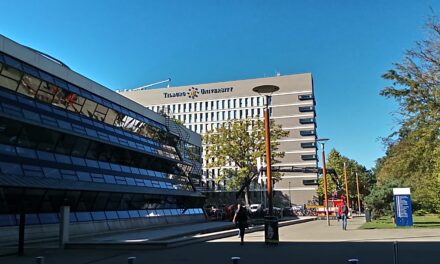“Is it true that the police started using grenades and bullets in the center?”
I was asked this question by one of my close Belarusian friends on the 9th of August. Only the day before I almost got arrested myself by the Belarusian security forces for being at the wrong place at the wrong time, only not getting arrested due to my Dutch nationality. These events are a good example of the chaos that erupted during and after the Belarusian elections. In this article, a select overview will be given of a few of the Human Rights violations conducted by the Belarusian authorities since August 9th.
On the 9th of August, the presidential elections in Belarus were held. These elections were marked by many experts as historical and crucial because many felt that after 26 years of reign Alexander Lukashenko, by some called “Europe’s last dictator”, could lose his power.
At 8 PM the polling stations closed and exit polls got published. The exit polls stated that Lukashenko had won the elections with around 80% of the votes. After this news, the people of Belarus immediately went on to the streets to peacefully protest against the re-election of Lukashenko. That night after the election, violent clashes led to 3,000 arrests in Minsk and other cities. Police fired tear gas, rubber bullets, and stun grenades, not seen before in Belarus, to disperse crowds. Due to this police violence, around 200 people got wounded on the first night.
On the night of the 10th of August, people went again out to peacefully protest. The police fired tear gas, rubber bullets, and stun grenades for the second night. This police violence resulted in again hundreds of people being injured and even the death of Alexander Taraikovsky. This man got shot with a rubber bullet from the distance of 10 meters resulting in a fatal wound. Next to this, another couple of thousand protesters got detained.
Those who are detained end up in horrible and inhumane conditions. We interviewed Eugene Korol a Belarusian Lawyer about his detention:
“I was arrested on the night of 11th of August we got searched by the military troops of the interior forces, the officer commanded to arrest us because we had white ribbons (a sign of opposition). They shouted “face against the earth” and we did as they asked. Then we got our hands tied. They transferred us in civil vans to the Okrestina detention center. The first thing they did there was throwing us out of the van and making us run through the corridor of security forces. They used their batons to beat detainees, I got hit once at the time. They have been also shouting at us that we are traitors of the nation, that we do not deserve to live, that we sold our country to the Czech Republic and Poland. This process lasted for 3 hours. All that time we heard screams of newcomers and those who did not obey. We got in a 6-persons cell but we were with 30 people in there. In the middle of the night, I was released without any charges. They did cross all lines while releasing me. They took us to the darkest corner of the territory and laid us down on the earth. They used their batons to beat our backside. They shouted that there will be no change, that we made a mistake and voted for the wrong president, that we are traitors, that we are lucky to still be alive. After hitting us a couple of times they made us stand up alongside the wall once again and forced to sing the national anthem. If you made a mistake or didn’t know the words – they would hit you under your knee using the firmest part of the baton – the handle. After that, we ran through a line of security forces towards the exit and they tried to hit us once again during that process.”
Eugene wasn’t a self-contained case of police brutality. Karina Malinovsky was brutally detained on August 11th in Hrodna and brought to a local police station. During the conversation, someone suddenly hit Karina in the stomach: “I screamed that I was pregnant, after that I was locked in a cell. Three hours later, my stomach started to ache. I asked to call an ambulance, once again told them that I was pregnant.” There, doctors recorded a ruptured cyst and prescribed emergency surgery: “After, I found out that I had lost the pregnancy.”2
According to Maria Ambrosava, each woman who got detained at the same time as her, was approached by the detention center staff and asked for her name, where she had been detained, and then hit in the face with the words: “Speak up, bitch.” Maria spent the next three days in a 10-square-meter cell with 36 women. “We were not properly fed, we all had to drink water from one plastic bottle. We heard the constant wailing of beaten people in the corridor and the yard, the cursing of the guards. I have not seen anything similar in a horror movie. One night, 20 girls were pushed into our room. Now we were 51 in the cell. These girls were glad that they got into a warm cell with a toilet. They told us that the police piled men along the fence, made them sing the hymn, and beat them until the feces came out. We heard these cries of terror. It seemed to me that my son was screaming. It feels like that needle in my heart won’t let go. We were told that we had to squeeze because 700 more people were to arrive.” 3
The Human Rights Center “Viasna” together with the World Organization against Torture (OMCT) began to collect testimonies of victims and document them. Expert Pavel Sapelka analyzed the reports and summarized them. He stated that between August 9 and 14, officers of various units of the Interior Ministry committed numerous crimes against Belarusian citizens. The victims, in particular, were injured by grenades, shots from non-lethal weapons, despite not attacking police officers or other citizens, not carrying weapons or other objects, acting in groups of people who did not commit attacks, and other actions that could threaten the lives and health of citizens.
Again it needs to be stressed that the personal stories of survivors aren’t self-contained cases. During the whole period of protests in Belarus:
- 450+ people got injured
- 50+ people got and are still missing
- At least 2 but most likely 6 people died
- 12.000+ people got arrested
Where the Western-world imposed sanctions, the Belarusian government doesn’t, upon today, take any action in regards to the Human Rights violations that took and take place on their territory. Pavel Sapelka said that: “The Prosecutor’s Offices and the Investigative Committee have yet failed to open a single criminal case to investigate systematic and widespread torture of protesters.”4
All events that are described above show the modern-day disgusting reality in Belarus even though it is only a small selection of the Human Rights violations that been committed. However, this doesn’t stop the Belarusian people from peacefully protesting in the future. Belarusian protester Anna Soltanowich says:
“We are exhausted of demonstrating, but we are determined to go through to the bitter end. Until we see this regime fall.”
1. BBC News. 2020, 8 September. What’s happening in Belarus?, https://www.bbc.com/news/world-europe-53799065
2. KYKY. 2020, 25 September. «Без жалости». Силовик ударил беременную в живот, и она потеряла ребенка. Сейчас с девушки требуют штраф в 270 BYN.
3. Viasna. 2020, 29 September. “They took away my bra with a breast prosthesis.” Survivor stories.
4. Viasna. 2020, 20 August. 10 points on torture and ill-treatment reports.
5. Wikipedia contributors. 2020, 6 oktober. 2020 Belarusian protests.
6. 24TV. 2020, 19 augustus. Сотня в лікарнях, десятки зникли безвісти: що відомо про долю мітингувальників з Білорусі.
7. TASS. 2020, 14 augustus. Belarus protests death toll may be higher than official numbers
8. Belsat. 2020, 21 september. Unprecedented number: Nearly 12K detainees since election day in Belarus.








